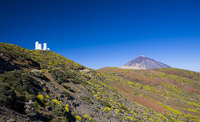Astronomy festival beneath Tenerife's starry skies

Starring Nobel Prize winners and Queen rock band founder and astrophysicist, Brian May, Starmus Festival will bring together leading specialists in astronomy from 20th to 25th June 2011 to promote the science of astronomy and its discoveries.
The event, which will be held at the Magma Art & Congress Centre in Tenerife and on the island of La Palma, will be the first festival to merge art displays, music and discussions led and attended by some of the most important names in the history of space science.
Timed to honour cosmonaut Yuri Gagarin, the first man to reach space 50 years ago, the festival coincides with the summer solstice and will see one of the largest congregations of international experts in this field. Among those attending are: Nobel Prize winners Jack Szostak and George Smoot, cosmonaut Alexei Loenov (first man to experience a space walk in 1965), astronaut Buzz Aldrin (member of Apollo 11 and the first man to land on the moon in 1969), Valentina Tereshkova (the first woman to travel to space in 1963), Jim Lovell (the pilot who played a pivotal role in the rescue of Apollo 13 following a failure in space), Richard Dawkins (evolutionary biologist), Kip Thorne (expert in astrophysics), Jill Tarter (astronomer and director of the SETI Institute), and Robert Williams (President of the Hubble Space Telescope Science Institute, USA).
Brian May, guitarist and founder of legendary rock band Queen, will make a guest appearance during the festival at Tangerine Dream’s “Sonic Universe” concert on 24th June 2011. Bringing a new feature to the band’s electronic music, Tangerine Dream will perform for the first time a series of “cosmic” tracks mixed with real sound effects recorded from the sun and other stars. Among the songs, two will be dedicated to Yuri Gagarin and Alexei Loenov. Chancellor of Liverpool John Moores University, Brian May will also be contributing to the festival as a speaker during a round table conference to discuss the future of space, as part of the full programme of conferences titled “Discover the cosmos and change the world!”
Set to be one of the largest gatherings of experts within the space community, the Starmus Festival will mark the start to the shooting star season, which runs through most of the summer, providing a magical experience to the festival attendees and the island’s visitors. Star gazing however, can be enjoyed year round in Tenerife, thanks to the low level of light pollution, altitude, clear skies and an optimal positioning on our planet, close to the equator and far from tropical storms.
The Starmus Festival is directed by Garik Israelian, astrophysicist at the Canary Islands Institute of Astrophysics, with the support of the Canary Islands Gran Telescope (GTC), UNESCO, the International Astronomical Union (IAU), the StarLight Foundation and other international organisations.
Tenerife’s star observation history dates back to 1964, when the first telescope on the island was used to examine zodiacal light. However, the prime weather and geographical conditions have made the island a preferred setting for the study of the sun and home to some of the most advanced solar telescopes in Europe and worldwide. In fact, the Canary Islands, along with Hawaii and Chile, are currently potential hotspots for the use of the telescopes of the future – according to scientific studies developed by the Canary Islands Institute of Astrophysics.
With the established Observatory of Teide, the Canary Islands Institute of Astrophysics which launched in 1979 and the Museum of Science and the Cosmos, Tenerife has already attracted renowned scientists from around the globe, yet the striking sight of stars and nebulas is still a recent discovery among tourists.
Visitors can book star gazing activities through the following companies, some of which offer exploration tours of the isle’s lunar landscape and other natural volcanic settings combined with a star gazing activity at night.
Observación de las Estrellas - astroamigos.com
Teideastro Volcanes y Estrellas - teideastro.com
Also accessible to the public is the Teide Observatory Visitors Centre, housed in a once unused dome set within the Teide National Park.
For further information on the festival please visit: starmus.com

